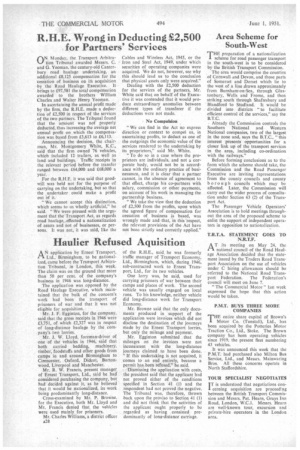Haulier Refus ed Aquisition
Page 30

If you've noticed an error in this article please click here to report it so we can fix it.
AN application by Ernest Transport, Ltd.. Birmingham, to be nationalized, came before the Transport Arbitration Tribunal, in London, this week. The claim was on the ground that more than 50 per cent. of the company's business in 1946 was long-distance.
The application was opposed by the Road Haulage Executive, which maintained that the bulk of the concern's work had been the transport of prisoners of war and that it was not eligible for acquisition. Mr. J. F. Egginton, for the company. said that the gross receipts in 1946 were £3,751, of which £2,327 was in respect of long-distance haulage by the company's two lorries. Mr. J. W. Lloyd. foreman-driver of one of the vehicles in 1946, said that both carried bedding, machinery, timber, foodstuffs and other goods from camps in and around Birmingham to Cirencester, Oxford, Didcot, Burtonwood, Liverpool and Manchester. Mr. R. W. Francis, present manager of Ernest Transport, Ltd., said he had considered purchasing the company, but had decided against it, as he believed that it would be nationalized, its work being predominantly long-distance. Cross-examined by Mr. P. Browne. for the Executive, both Mr. Lloyd and Mr. Francis denied that the vehicles were used mainly for prisoners.
Mr. Charles Williams, a district officer A28 of the R.H.E., said. he was formerly traffic manager of Transport Economy, Ltd., Birmingham, which, during 1946, sub-contracted work to Ernest Transport, Ltd., for its two vehicles.
One lorry was, he said, used for carrying prisoners of war between their camps and places of work. The second vehicle was usually engaged on local runs. To his knowledge, neither vehicle did long-distance work for Transport Economy.
Mr. Browne said that the only documents produced in support of the application were invoices which did not disclose the destination of the journeys made by the Ernest Transport lorries, but only the mileage and payment.
Mr. Egginton submitted that the mileages on the invoices were not inconsistent with the long-distance journeys claimed to have been done. "If this undertaking is not acquired, it comes to an end entirely, because a permit has been refused," he said.
Dismissing the application with costs, the president said that the applicant had not proved either of the conditions specified in Section 41 (1) and the respondent had not proved the negative. The Tribunal was, therefore, thrown back upon the proviso to Section 41(1) and did not think that the activities of the applicant ought properly to be regarded as having consisted predominantly of long-distance carriage.




























































































